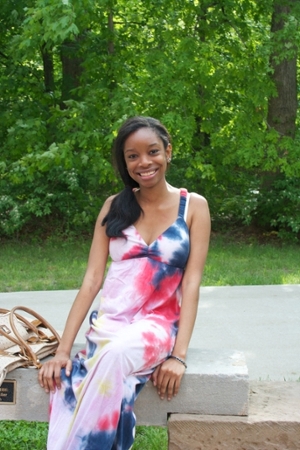
Mariam Keita
Mariam Keita is a true citizen of the world. Born in the US to parents from Mali, she went on to live in Mali, Libya, and France before returning to the US to study at SIU. She came to SIU to study at CESL (the Center for English as a Second Language), planning to stay for just a few months to improve her English.
But she stayed rather longer than that. “I passed the TEOFL (Test of English as a Foreign Language) without taking any classes. At SIU I’d met people from many places and different backgrounds and cultures; I was really relieved not to be the only one from abroad. The welcoming experience really made me want to stay.”

So she went looking for a major to study at SIU, and soon settled on FLIT; she studied Spanish, and added a major in International Studies as well. “I started by looking at things like management, but also wanted something that would help me diversify my education and allow me to explore new cultures.”
“I think FLIT is an excellent program, because you get to have some business courses but you also get to look around in all the courses you’re taking and see what interests you most. It gives you lots of opportunities afterwards; I could be working for a government or a business or a social organization, it really depends on what I’m interested in; and I can live in different countries, which I’d really like to.”
Mariam was educated in French, and also speaks Bambara (a language common in West Africa), and Arabic, but chose to study Spanish at SIU. Among her favorite classes at SIU was her business Spanish course with Dimitrios Karayiannis. “I really learned a lot; every chapter was related to a specific country in Latin America, which really gave me a good aspect of the business culture in Latin America.”
Then there was FL 105, the introduction to International Studies. “Every week we had a different guest speaker about some different topic—tourism, anthropology. That was really nice. The textbook did a good job giving the history of various concepts and events; religion in the Middle East; tourism; colonization; World War II, etc.”
While most of her fellow students had yet to full experience different cultures abroad, Mariam had done so on multiple occasions. But the course helped her understand what she’d done. “Before I couldn’t put a name or a theory on that—when you go to a country you can be homesick and lost, you’re kind of lost and it’s difficult, but then you start to adapt and you get more comfortable. You learn what kind of food you’re going to have, how people interact, and then it’s more normal. Then you’re sad again when you have to leave. I told the other students that what the book said was true; it’s hard, but when you overcome the obstacles you’re really proud of yourself.”
“Now it’s a reflex for me never to judge a culture by what they do; I don’t judge. That’s what I learned from all those experiences. I try to learn about the culture, to be more at ease with them and they are more at ease with me. You need to show that you’re interested in what they do and that there’s nothing wrong with that.”
Home is a complex topic for Mariam. “Where I’m from is a difficult question to answer. I don’t think just being born in a country makes you from it. From all of the countries I’ve been through over the years, culture isn’t something you’re born with, it’s something you learn. When I’m back in France now, they say I’m acting so American. ‘Oh you don’t kiss on the cheeks any more, you keep a distance from people.’ I do miss the closeness with friends; in France you don’t have different sets of friends for different things, friends for studying, friends to go with the movies, friends to work out with. Friends can show up anytime, they are like family. The same in Libya.”
Now Mariam is off on an internship for FLIT in Argentina, where she will work for a non-profit organization that works to foster international cooperation in Buenos Aires. After that, who knows? “I’d like to go to Asia—Hong Kong, Japan, South Korean. Maybe Eastern Europe—I’ve never been there. Why not?”
